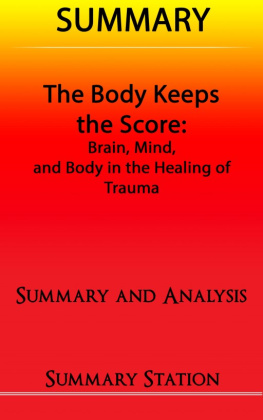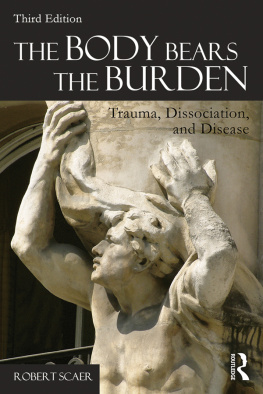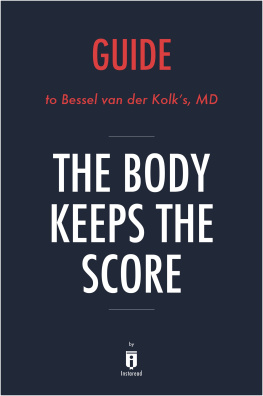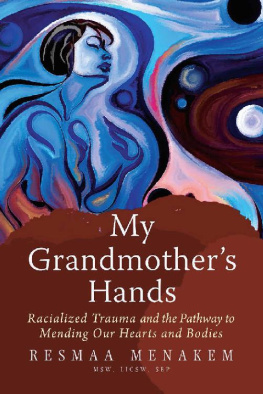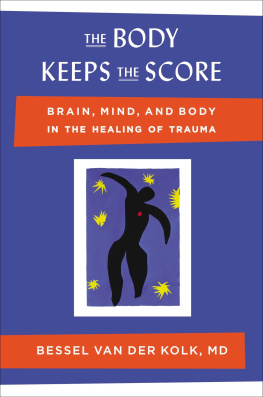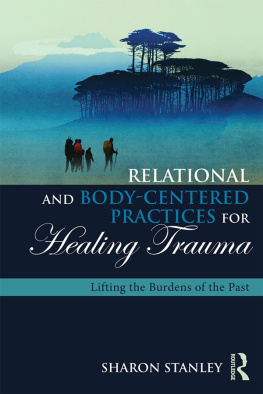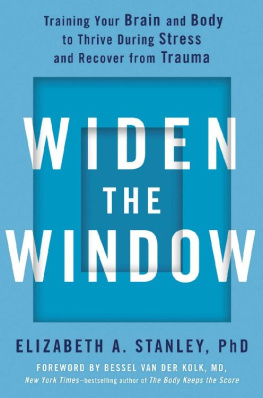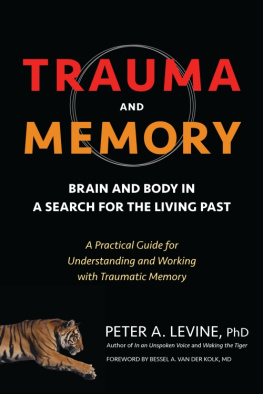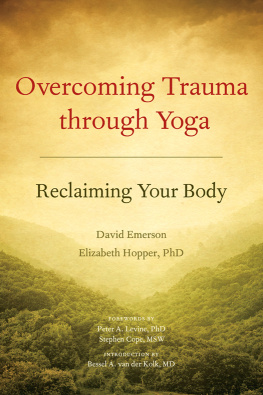Praise for The Body Keeps the Score
This book is a tour de force. Its deeply empathic, insightful, and compassionate perspective promises to further humanize the treatment of trauma victims, dramatically expand their repertoire of self-regulatory healing practices and therapeutic options, and also stimulate greater creative thinking and research on trauma and its effective treatment. The body does keep the score, and Van der Kolks ability to demonstrate this through compelling descriptions of the work of others, his own pioneering trajectory and experience as the field evolved and him along with it, and above all, his discovery of ways to work skillfully with people by bringing mindfulness to the body (as well as to their thoughts and emotions) through yoga, movement, and theater are a wonderful and welcome breath of fresh air and possibility in the therapy world.
Jon Kabat-Zinn, professor of medicine emeritus, UMass Medical School; author of Full Catastrophe Living
This exceptional book will be a classic of modern psychiatric thought. The impact of overwhelming experience can only be truly understood when many disparate domains of knowledge, such as neuroscience, developmental psychopathology, and interpersonal neurobiology are integrated, as this work uniquely does. There is no other volume in the field of traumatic stress that has distilled these domains of science with such rich historical and clinical perspectives, and arrived at such innovative treatment approaches. The clarity of vision and breadth of wisdom of this unique but highly accessible work is remarkable. This book is essential reading for anyone interested in understanding and treating traumatic stress and the scope of its impact on society.
Alexander McFarlane AO, MB BS (Hons) MD FRANZCP, director of the Centre for Traumatic Stress Studies, The University of Adelaide, South Australia.
This is an amazing accomplishment from the neuroscientist most responsible for the contemporary revolution in mental health toward the recognition that so many mental problems are the product of trauma. With the compelling writing of a good novelist, van der Kolk revisits his fascinating journey of discovery that has challenged established wisdom in psychiatry. Interspersed with that narrative are clear and understandable descriptions of the neurobiology of trauma; explanations of the ineffectiveness of traditional approaches to treating trauma; and introductions to the approaches that take patients beneath their cognitive minds to heal the parts of them that remained frozen in the past. All this is illustrated vividly with dramatic case histories and substantiated with convincing research. This is a watershed book that will be remembered as tipping the scales within psychiatry and the culture at large toward the recognition of the toll traumatic events and our attempts to deny their impact take on us all.
Richard Schwartz, originator, Internal Family Systems Therapy
TheBody Keeps the Score is clear, fascinating, hard to put down, and filled with powerful case histories. Van der Kolk, the eminent impresario of trauma treatment, who has spent a career bringing together diverse trauma scientists and clinicians and their ideas, while making his own pivotal contributions, describes what is arguably the most important series of breakthroughs in mental health in the last thirty years. Weve known that psychological trauma fragments the mind. Here we see not only how psychological trauma also breaks connections within the brain, but also between mind and body, and learn about the exciting new approaches that allow people with the severest forms of trauma to put all the parts back together again.
Norman Doidge, author of The Brain That Changes Itself
In The Body Keeps the Score we share the authors courageous journey into the parallel dissociative worlds of trauma victims and the medical and psychological disciplines that are meant to provide relief. In this compelling book we learn that as our minds desperately try to leave trauma behind, our bodies keep us trapped in the past with wordless emotions and feelings. These inner disconnections cascade into ruptures in social relationships with disastrous effects on marriages, families, and friendships. Van der Kolk offers hope by describing treatments and strategies that have successfully helped his patients reconnect their thoughts with their bodies. We leave this shared journey understanding that only through fostering self-awareness and gaining an inner sense of safety will we, as a species, fully experience the richness of life.
Stephen W. Porges, PhD, professor of psychiatry, University of North Carolina at Chapel Hill; author of The Polyvagal Theory: Neurophysiological Foundations of Emotions, Attachment, Communication, and Self-Regulation
Bessel van der Kolk is unequaled in his ability to synthesize the stunning developments in the field of psychological trauma over the past few decades. Thanks in part to his work, psychological traumaranging from chronic child abuse and neglect, to war trauma and natural disastersis now generally recognized as a major cause of individual, social, and cultural breakdown. In this masterfully lucid and engaging tour de force, Van der Kolk takes usboth specialists and the general public on his personal journey and shows what he has learned from his research, from his colleagues and students, and, most important, from his patients. The Body Keeps the Score is, simply put, brilliant.
Onno van der Hart, PhD, Utrecht University, The Netherlands; senior author, The Haunted Self: Structural Dissociation and the Treatment of Chronic Traumatization
The Body Keeps the Score articulates new and better therapies for toxic stress based on a deep understanding of the effects of trauma on brain development and attachment systems. This volume provides a moving summary of what is currently known about the effects of trauma on individuals and societies, and introduces the healing potential of both age-old and novel approaches to help traumatized children and adults fully engage in the present.
Jessica Stern, policy consultant on terrorism; author of Denial: A Memoir of Terror
A book about understanding the impact of trauma by one of the true pioneers in the field. It is a rare book that integrates cutting edge neuroscience with wisdom and understanding about the experience and meaning of trauma, for people who have suffered from it. Like its author, this book is wise and compassionate, occasionally quite provocative, and always interesting.
Glenn N. Saxe, MD, Arnold Simon Professor and chairman, Department of Child and Adolescent Psychiatry; director, NYU Child Study Center, New York University School of Medicine.
A fascinating exploration of a wide range of therapeutic treatments shows readers how to take charge of the healing process, gain a sense of safety, and find their way out of the morass of suffering.
Francine Shapiro, PhD, originator of EMDR therapy; senior research fellow, Emeritus Mental Research Institute; author of Getting Past Your Past
As an attachment researcher I know that infants are psychobiological beings. They are as much of the body as they are of the brain. Without language or symbols infants use every one of their biological systems to make meaning of their self in relation to the world of things and people. Van der Kolk shows that those very same systems continue to operate at every age, and that traumatic experiences, especially chronic toxic experience during early development, produce psychic devastation. With this understanding he provides insight and guidance for survivors, researchers, and clinicians alike. Bessel van der Kolk may focus on the body and trauma, but what a mind he must have to have written this book.
Next page

